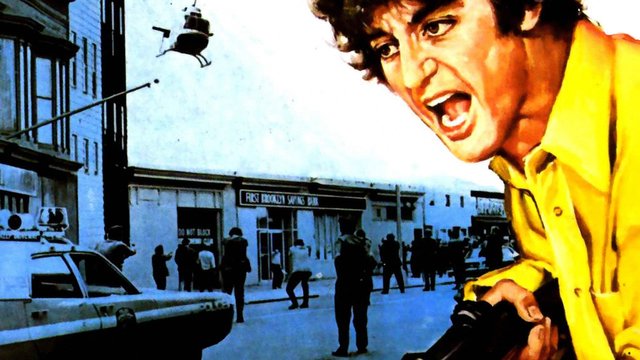Retro Film Review: Dog Day Afternoon (1975)

The times have changed. Today American television tries to exploit each and every "saucy" event from the headlines in order to produce couple of uninspiring and formulaic TV movies or mini-series. But in good old days saying "life is stranger than fiction" had some value in screenwriter's minds. At least this is impression you might get from a real life event that inspired Dog Day Afternoon, 1975 drama
directed by Sydney Lumet, probably one of the most legendary
films in the history of American cinema.
Plot begins in August 1972 when group of three men, led by Sonny Wartzik (played by Al Pacino) enters First Savings Bank in Brooklyn in order to rob it. Sonny used to work in a bank and he is supposed to know all the tricks of trade, making the whole operation routine. But things go bad from the start, when one of the robbers simply chickens out and runs, thus leaving Sonny with his silent and dim-witted partner Sal (played by John Cazale) to finish the job. It turns out that the bank vault is mostly empty, but this is not the last unpleasant surprise for Sonny. Before he is able to get out, the bank is surrounded by hundreds of policemen led by Lt. Moretti (played by Charles Durning). Sonny decides to get out of this situation by taking bank personnel as hostages and demanding plane that would take him and Sal out of the country. But before FBI comes and takes over the negotiations, situation gets out of control - policemen around the bank are joined by thousands of onlookers and the media soon starts reporting some embarrassing details about Sonny's private life and truly bizarre motive for his desperate act.
Dog Day Afternoon has many trademarks of 1970s, era that is often referenced as the Golden Age of American cinema. First of all, the main role is played by Al Pacino in his prime, while the supporting role is played by John Cazale, character actor who appeared in few movies but nevertheless managed to leave lasting impression on future generations of filmophiles. The film is directed by Sydney Lumet in his prime, and his style gives impression of a time when filmmakers dared to employ techniques that would look unacceptably "artsy" to present-day Hollywood. The movie lacks musical soundtrack, almost entire plot takes place on a single location and the genre shifts from comedy in the beginning to the serious drama at the end.
Despite all of that, Dog Day Afternoon works and it could be enjoyed even by the audience unfamiliar to 1970s cinema. Sydney Lumet, same as in his 1957 masterpiece 12 Angry Men, shows how he could overcome limitations of the plot with an excellent casting and flawless direction. Real life perpetrators of the robbery could be hardly anything other than pathetic losers, but Pacino and Cazale bring a lot of humanity while portraying and making the audience sympathising with them, despite the obvious lunacy of their actions. Lumet shows great talent for pacing that gives "real-time" feeling to Dog Day Afternoon while making the film six times shorter than the real event. The audience is never bored, thanks to the good script by Frank Pierson that compensates the lack of action with good dialogue. Legendary performances by Pacino and Cazale are well matched by those of Charles Durning and Chris Sarandon, but even the bit parts are good. Sully Boyar is more than fine as duty-bound bank manager Mulvaney, same as various actresses who are very convincing in displaying symptoms of "Stockholm Syndrome". The most effective bit parts, however, belong to the actors playing FBI agents. Lance Henriksen is truly menacing in one of his earliest role, and the exchange between Pacino's character and Sheldon, FBI agent in charge played by James Broderick, is simply chilling.
Perhaps the only major flaw of the film might be found in its date. Dog Day Afternoon, based on the true event, is a film that could be best understood only in the context of the times when it was produced. Early 1970s, although less stormy than late 1960s, still represented the era of great social change in America with anti-establishment behaviour being fashionable among the large segments of society. Even the most pathetic criminals were able to arouse popular sympathy by couple of simple slogans, like "Attica", Sonny's chant that brought very fresh memories of 1971 prison riot that had ended with massacre of inmates. And for homosexual community that had recently won the right to formally exist Sonny became a hero simply because of the motive for his totally insane and self- destructive action. In our "politically correct" times, when the former miscasts and minorities became part of social mainstream, Dog Day Afternoon can't be as effective as it was almost three decades ago. But despite that, it is very good film could still be viewed and enjoyed by latter generations.
RATING: 8/10 (+++)
(Note: The text in its original form was posted in Usenet newsgroup rec.arts.movies.reviews on January 9th 2002)
==
Blog in Croatian https://draxblog.com
Blog in English https://draxreview.wordpress.com/
Cent profile https://beta.cent.co/@drax
Minds profile https://www.minds.com/drax_rp_nc
Brave browser: https://brave.com/dra011
BTC donations: 1EWxiMiP6iiG9rger3NuUSd6HByaxQWafG
ETH donations: 0xB305F144323b99e6f8b1d66f5D7DE78B498C32A7
Movie URL: https://www.themoviedb.org/movie/968-dog-day-afternoon?language=en-US
Critic: AAA